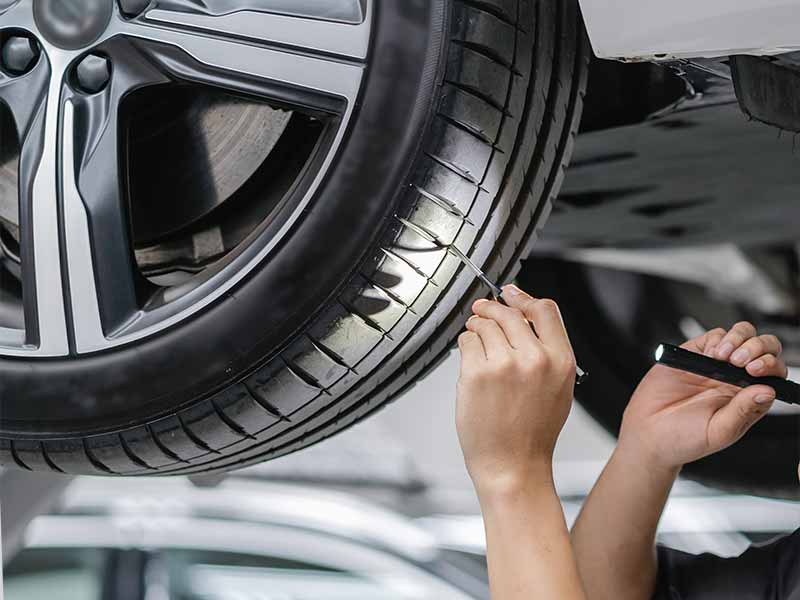Tire rotation is important for ensuring you get the most tread life out of your tires and maintaining your tire warranty. It can also bring to attention problems with your tires that need to be fixed.
Tire rotation itself isn’t the cause of the shaking. Not rotating your tires allows some problems that are shortening the life your your tires to go unnoticed. While finding problems isn’t the point of tire rotation, it is one of the possible outcomes.
Does Tire Rotation Cause Shaking?
Tire rotation itself doesn’t cause shaking or vibration, but it can cause previously less noticeable problems that can cause shaking to become much more noticeable. This is a good thing and will bring your attention to issues that need to be fixed.
What Can Cause Shaking After Tire Rotation
The main causes of steering wheel or car shaking after tire rotation are:
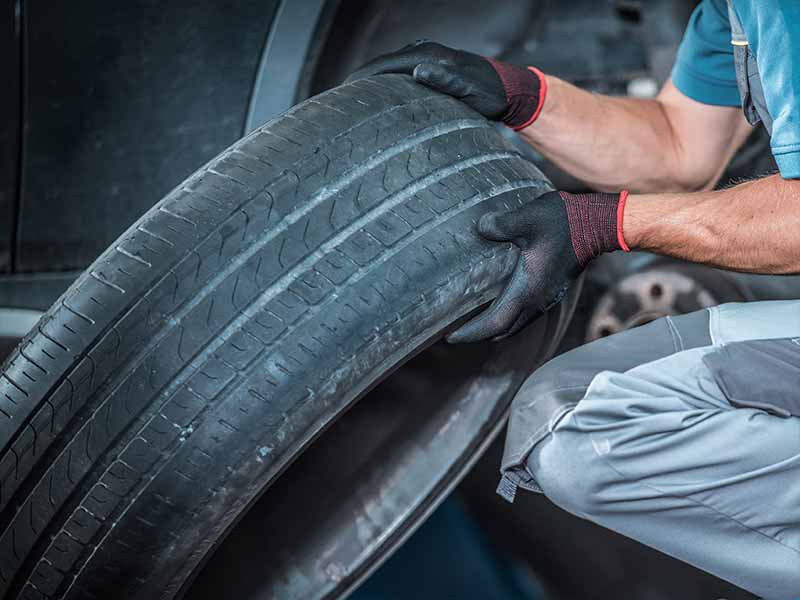
Uneven Tire Wear
It’s not uncommon for there to be some slight vibration or shaking of your steering wheel after having your tires rotated. This is especially true if you have not had a rotation performed in quite some time or if an alignment service hasn’t been done for a while.
Uneven wear can cause significant vibration and road noise immediately after having your tires rotated. It’s possible for it to also cause some shaking of the steering wheel. It’s not likely be able to cause actual shaking of the car however.
Solution
Uneven tire wear can be caused by over or under inflation, an out of balance tire, or alignment issues. The most common cause of uneven wear that would cause steering wheel shake or vibrations is alignment.
An alignment should be performed at least every 10,000 miles to ensure even tire wear and that suspension components aren’t worn or damaged.
If you’ve had an alignment performed with your tire rotation you should allow time for the tires to wear in to their new positions and smooth out.
If the problem persists, you may have a suspension problem that was not detected during the alignment process. Or you may have another problem that is the source of the shake.
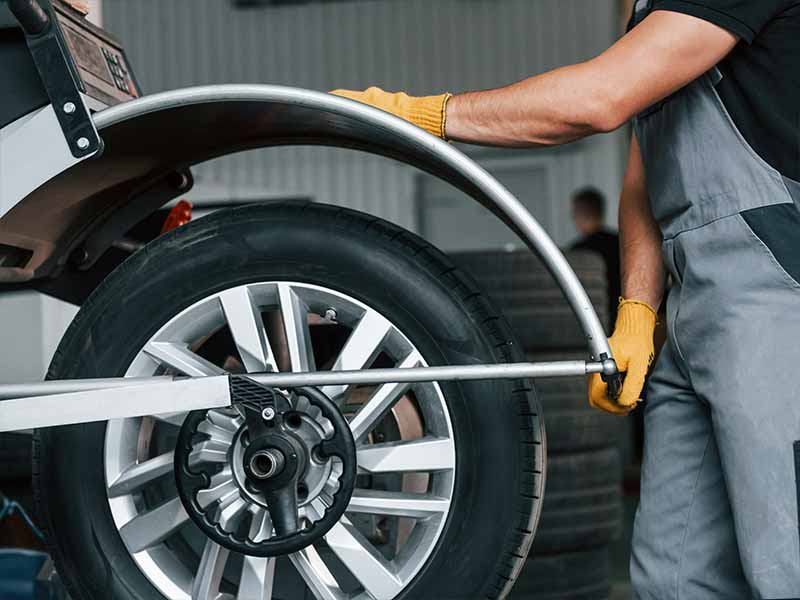
Unbalanced Tire
Unbalanced tires are the most common cause of more prominent shaking of your car or truck after a tire rotation.
Often, rear tires that are moved to the front axle during the rotation can have an minor balance problem that is difficult to notice in the rear tires location, but very obvious when on the front axle that’s connected directly to the steering wheel.
Tires can fall out of balance slowly over time as they wear down. Also, wheel weights can come loose and be lost which can have a dramatic effect on the balance of your tires.
Solution
Having your tires balanced correctly should solve the problem if it is a balance issue. The best method for balancing tires is to use a road force balancer. Road force balancing applies a force to the wheel and tire assembly like how your vehicle will press the tire against the road.
Road force balancing will prevent balance problems at higher speeds than traditional tire balancing.
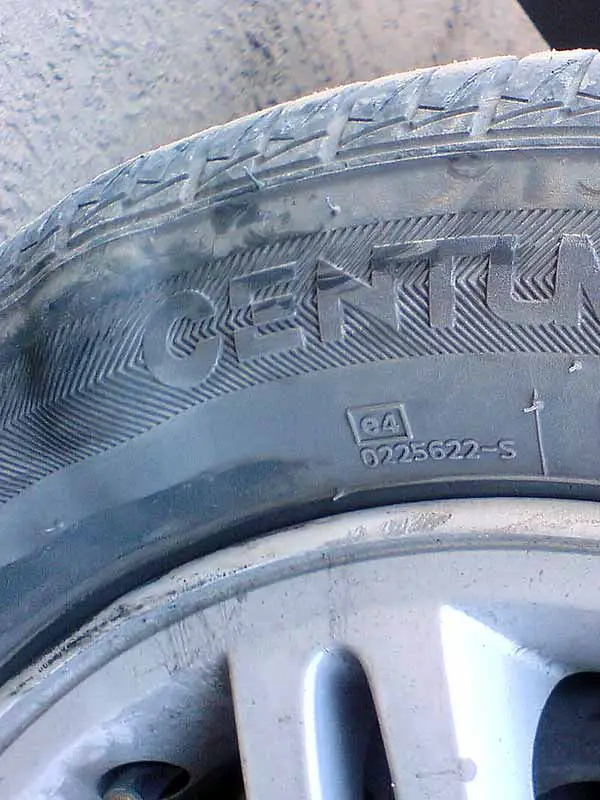
Damaged Tire
Damaged tires can cause shaking and vibrations. This can be because the tire has become out-of-round due to broken belts. Broken belts can cause bulges in the sidewall or uneven tread.
It can sometimes be difficult to notice internal damage to a tire. The pros at your local tire shop may be wiser to rely on than trying to inspect your tires for deformations yourself.
Obvious sidewall damage can be easily spotted, but understanding how significant the damage underneath the cosmetic blemishes can be more difficult to understand.
Solution
Replacing a damaged tire with a pair of new tires is the best way to ensure that you solve the issue with the tire and don’t have inconsistent grip from left to right. If you have an all wheel drive car or truck, it’s recommended to replace all four tires to prevent traction issues or cause stress on your drivetrain.
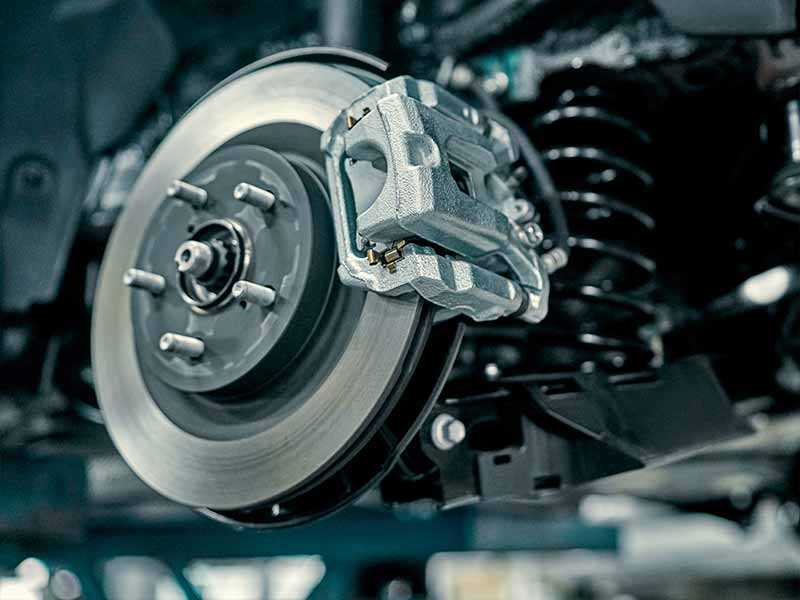
Warped Brake Rotors
It’s possible for brake rotors to become warped if lug nuts are over-tightened. Manufacturer’s specify a certain amount of torque that should be applied when tightening lug nuts. Going beyond this spec can prevent your brake rotors from being able to expand and contract properly as they heat up and cool down.
If your lug nuts were over-tightened during rotation, as you drive home from the tire shop the brakes will cause the rotors to heat up quite a bit and warping can occur as they cool back down. Shaking caused by warped rotors will usually only be felt during braking.
Solution
If you have warped rotors, they can often be corrected by having a service performed called “turning”. Turning rotors is the process of removing material from the surface of the rotors until they have been returned to a perfectly flat and balanced state.
Rotors can’t always be “turned” however. Rotors wear down over time and lose thickness. Once they become too thin, there isn’t enough material left to allow them to be trued.
Is Shaking Normal After Tire Rotation?
Shaking is not normal after tire rotation, but it does happen for a few well known reasons. Mild vibrations occur mostly due to uneven tire wear or very minor tire balance problems.
Regular wheel alignment is recommended to ensure even tire wear. 10,000 miles is my recommendation so that it can be grouped with every other tire rotation.
Worn tires can become unbalanced slightly over time. Many car owners aren’t aware of this issue. Because of this, it’s recommended to have tires balanced regularly. Every 10,000 miles is a good interval to consider although some will recommend waiting longer.
More noticeable shaking is commonly caused by tire balance issues such as lost wheel weights or slightly bent wheels. Also, tire damage can cause more significant shaking.
When shaking occurs after a tire rotation it is usually due to issues with the rear tires that get moved to the front. Front tires are much easier to notice shaking. Not only are they physically closer to the driver, but they’re also connected to the steering wheel which transmits vibrations directly to the driver’s hands.

Can Tire Rotation Cause A Steering Wheel To Shake?
Your steering wheel shouldn’t shake or vibrate after you rotate your tires, but it is maintenance service that does cause this if issues are present. Milder steering wheel shake is more common than harsher shaking felt through the entire body of the car.
Why Does My Steering Wheel Shake After Tire Rotation?
Not rotating your tires for a long period of time can allow uneven tire wear, tire balance issues, and even tire damage accumulate on the rear tires and then become noticeable once they are rotated to the front axle.
Is It Normal For Steering Wheel To Shake After Tire Rotation?
It isn’t normal for vibrations and shaking of your steering wheel to occur after rotation, but it is common as a symptom of a problem or due to uneven wear that will go away as the tires wear in and smooth out after the first 50 miles or so of driving in their new positions.
Steering Wheel Vibration At High Speeds After Tire Rotation
Steering wheel vibration at high speeds (65 mph and above) is usually a sign of out of balance tires. Minor balance issues come magnified the faster you go.
A more advanced method of tire balancing is called road force balancing. A road force balancer applies pressure to the tire as it is balanced to simulate the force of the road on the tire. This results in a more accurately balanced tire and less steering wheel vibration at higher speed.
Final Thoughts
There are several reasons you may be experiencing some shaking and vibration after you rotate your tires. It’s usually a symptom of a problem that needs to be resolved to ensure your tires wear evenly and last as long as possible.
Tire rotation isn’t the cause of the problem, but it is a tire maintenance service that can bring to attention problems that would have otherwise gone unnoticed.
Resources
Below are some links you may find helpful when learning about tires
